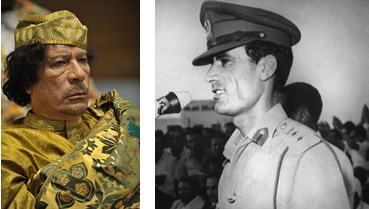
Yesterday the news out of Libya indicated a sudden reversal of fortune for the forces opposed to Qaddafi. Two of his sons are now in custody, many parts of Libya are no longer under his control and the residents of the city are finally free to join the revolution. The Arab Spring has weathered a hot summer in Libya. It seems only a matter of time before Qaddafi is captured, killed or escapes to a safe haven. The pundits are spinning away, but predicting the actions of a megalomaniac who has exercised total power for some 42 years is a difficult task.
The future of Libya is uncertain, as is the case for Yemen and Syria, where protests continue despite the reluctance of a dictatorial leader to yield power. But the fact that Qaddafi could be in power for such a long time, be so ruthless to his own people and sponsor terrorism abroad is a chilling reminder that morality as a human right inevitably takes back seat to the Machiavellian bent of politics. The irony is that the Qaddafis of this world did not rise out of a desert vacuum, but are products of European intrusion into the region. In the case of Libya, Italy vexed its power under Mussolini over its southern neighbor, attempting to make it a fascist enclave and succeeding to a certain extent. After Italy’s defeat in World War II, King Idris (who had fled to Egypt in 1922) was reinstalled by the Allies. The king was deposed when Colonel Qaddafi assumed power in a coup in September of 1969. Idris was the one and only “king” of Libya, and survived after his expulsion until death in Cairo in 1983.
Today all eyes are on Tripoli and the ragtag collection of Libyans who rode the back of NATO airstrikes and direct foreign assistance to finally break Qaddafi’s grip. The outcome was never really in doubt, despite the fact that Qaddafi had enough imported weapons to last for months. Unlike some of its neighbors, Libya has a relatively low population and a vast supply of oil, so there is a path to success that is far less difficult that that for neighboring Egypt, the two Sudans or Somalia. But before we look at what the future holds for Libya, it is important to understand its past. If the media follow the Fox News scenario of the region as a land that breeds dictators and radical Muslims sui genesis out of the desert sand, rather than pointing out the contorted history of colonial and military interference, our calls for a democracy will be more of the blind leading the blind.